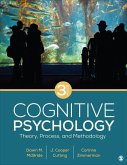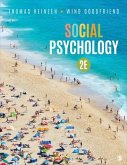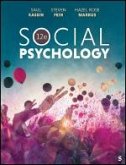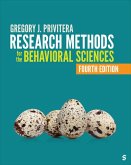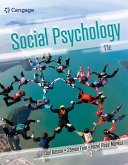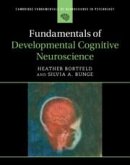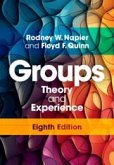William J Ray
Psychopathology
William J Ray
Psychopathology
- Loseblattsammlung
- Merkliste
- Auf die Merkliste
- Bewerten Bewerten
- Teilen
- Produkt teilen
- Produkterinnerung
- Produkterinnerung
In Psychopathology, Fourth Edition, best-selling author William J. Ray brings together current perspectives concerning the manner in which the human mind, behavior, and experience can be understood.
Andere Kunden interessierten sich auch für
![Cognitive Psychology Cognitive Psychology]() Dawn M McbrideCognitive Psychology192,99 €
Dawn M McbrideCognitive Psychology192,99 €![Social Psychology Social Psychology]() Thomas HeinzenSocial Psychology192,99 €
Thomas HeinzenSocial Psychology192,99 €![Social Psychology Social Psychology]() Saul KassinSocial Psychology225,99 €
Saul KassinSocial Psychology225,99 €![Research Methods for the Behavioral Sciences Research Methods for the Behavioral Sciences]() Gregory J PriviteraResearch Methods for the Behavioral Sciences152,99 €
Gregory J PriviteraResearch Methods for the Behavioral Sciences152,99 €![Social Psychology Social Psychology]() Saul KassinSocial Psychology67,99 €
Saul KassinSocial Psychology67,99 €![Fundamentals of Developmental Cognitive Neuroscience Fundamentals of Developmental Cognitive Neuroscience]() Heather BortfeldFundamentals of Developmental Cognitive Neuroscience168,99 €
Heather BortfeldFundamentals of Developmental Cognitive Neuroscience168,99 €![Groups Groups]() Rodney W NapierGroups190,99 €
Rodney W NapierGroups190,99 €-
-
-
In Psychopathology, Fourth Edition, best-selling author William J. Ray brings together current perspectives concerning the manner in which the human mind, behavior, and experience can be understood.
Hinweis: Dieser Artikel kann nur an eine deutsche Lieferadresse ausgeliefert werden.
Hinweis: Dieser Artikel kann nur an eine deutsche Lieferadresse ausgeliefert werden.
Produktdetails
- Produktdetails
- Verlag: Sage Publications
- 4th edition
- Seitenzahl: 792
- Erscheinungstermin: 20. Februar 2024
- Englisch
- Abmessung: 276mm x 212mm x 28mm
- Gewicht: 1597g
- ISBN-13: 9781071928479
- ISBN-10: 1071928473
- Artikelnr.: 69123908
- Herstellerkennzeichnung
- Libri GmbH
- Europaallee 1
- 36244 Bad Hersfeld
- gpsr@libri.de
- Verlag: Sage Publications
- 4th edition
- Seitenzahl: 792
- Erscheinungstermin: 20. Februar 2024
- Englisch
- Abmessung: 276mm x 212mm x 28mm
- Gewicht: 1597g
- ISBN-13: 9781071928479
- ISBN-10: 1071928473
- Artikelnr.: 69123908
- Herstellerkennzeichnung
- Libri GmbH
- Europaallee 1
- 36244 Bad Hersfeld
- gpsr@libri.de
William J. Ray is an Emeritus Professor of Psychology at Pennsylvania State University. He received his PhD from Vanderbilt University and was a Fellow in Medical Psychology at the University of California Medical Center in San Francisco. He received his undergraduate degree from Eckerd College, where he learned about the value of primary sources and the need to integrate information from a number of perspectives. As part of his clinical training, he has worked in a number of mental hospitals and clinics across the country, where he developed an appreciation of the experiences of those with mental disorders. In his career, he has served as a visiting professor and researcher at the University of Hawaii, Münster University, University of Rome, Tübingen University, and Konstanz University. At Penn State, he was the Director of the SCAN (Specialization in Cognitive and Affective Neuroscience) program and was previously the Director of the Clinical Psychology Program. His research has focused on approaching clinical questions from a neuroscience perspective. He has used psychophysiological and brain imaging techniques such as EEG, MEG, DTI, and fMRI to study emotionality, psychopathology, and individual differences. These studies can be found in his numerous articles, book chapters, and books. His work has been published in such journals as Science, Proceedings of the National Academy of Sciences, Journal of Neuroscience, Psychophysiology, Physiological Reviews, Journal of Personality and Social Psychology, Developmental Psychology, Journal of Abnormal Psychology, Cognitive Brain Research, Biological Psychology, NeuroImage, and Clinical Neurophysiology. This work has been funded by both national and international agencies including NIH, NIMH, NASA, NATO, and the DAAD. In addition to research, teaching has been an important part of his career. His textbooks include Abnormal Psychology, Methods Toward a Psychology of Behavior and Experience, Psychophysiological Methods (with Robert Stern & Karen Quigley), and Evolutionary Psychology: Neuroscience Perspectives Concerning Human Behavior and Experience.
Chapter 1: An Overview of Psychopathology and Changing Conceptualizations
of Mental Illness
Chapter 2: Neuroscience Approaches to Understanding Psychopathology
Chapter 3: Research Methods
Chapter 4: Assessment and Classification of Psychological Disorders
Chapter 5: Childhood and Adolescent-Onset Disorders
Chapter 6: Mood Disorders
Chapter 7: Stress, Trauma, and PTSD
Chapter 8: Anxiety Disorders and Obsessive-Compulsive Disorders
Chapter 9: Dissociative Disorders and Somatic Symptom Disorders
Chapter 10: Eating Disorders
Chapter 11: Sexual Disorders, Paraphilic Disorders, and Gender Dysphoria
Chapter 12: Substance-Related and Addictive Disorders
Chapter 13: Schizophrenia
Chapter 14: Personality Disorders
Chapter 15: Neurocognitive Disorders
Chapter 16: The Law and Mental Health
of Mental Illness
Chapter 2: Neuroscience Approaches to Understanding Psychopathology
Chapter 3: Research Methods
Chapter 4: Assessment and Classification of Psychological Disorders
Chapter 5: Childhood and Adolescent-Onset Disorders
Chapter 6: Mood Disorders
Chapter 7: Stress, Trauma, and PTSD
Chapter 8: Anxiety Disorders and Obsessive-Compulsive Disorders
Chapter 9: Dissociative Disorders and Somatic Symptom Disorders
Chapter 10: Eating Disorders
Chapter 11: Sexual Disorders, Paraphilic Disorders, and Gender Dysphoria
Chapter 12: Substance-Related and Addictive Disorders
Chapter 13: Schizophrenia
Chapter 14: Personality Disorders
Chapter 15: Neurocognitive Disorders
Chapter 16: The Law and Mental Health
Chapter 1: An Overview of Psychopathology and Changing Conceptualizations
of Mental Illness
Chapter 2: Neuroscience Approaches to Understanding Psychopathology
Chapter 3: Research Methods
Chapter 4: Assessment and Classification of Psychological Disorders
Chapter 5: Childhood and Adolescent-Onset Disorders
Chapter 6: Mood Disorders
Chapter 7: Stress, Trauma, and PTSD
Chapter 8: Anxiety Disorders and Obsessive-Compulsive Disorders
Chapter 9: Dissociative Disorders and Somatic Symptom Disorders
Chapter 10: Eating Disorders
Chapter 11: Sexual Disorders, Paraphilic Disorders, and Gender Dysphoria
Chapter 12: Substance-Related and Addictive Disorders
Chapter 13: Schizophrenia
Chapter 14: Personality Disorders
Chapter 15: Neurocognitive Disorders
Chapter 16: The Law and Mental Health
of Mental Illness
Chapter 2: Neuroscience Approaches to Understanding Psychopathology
Chapter 3: Research Methods
Chapter 4: Assessment and Classification of Psychological Disorders
Chapter 5: Childhood and Adolescent-Onset Disorders
Chapter 6: Mood Disorders
Chapter 7: Stress, Trauma, and PTSD
Chapter 8: Anxiety Disorders and Obsessive-Compulsive Disorders
Chapter 9: Dissociative Disorders and Somatic Symptom Disorders
Chapter 10: Eating Disorders
Chapter 11: Sexual Disorders, Paraphilic Disorders, and Gender Dysphoria
Chapter 12: Substance-Related and Addictive Disorders
Chapter 13: Schizophrenia
Chapter 14: Personality Disorders
Chapter 15: Neurocognitive Disorders
Chapter 16: The Law and Mental Health


